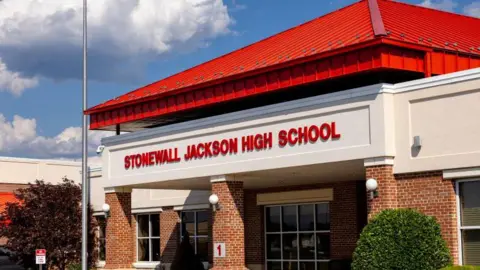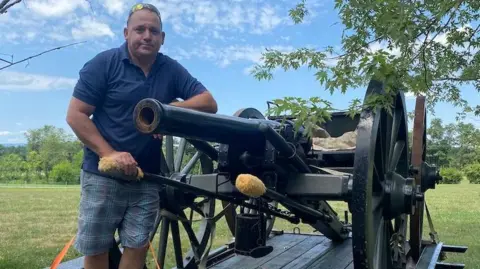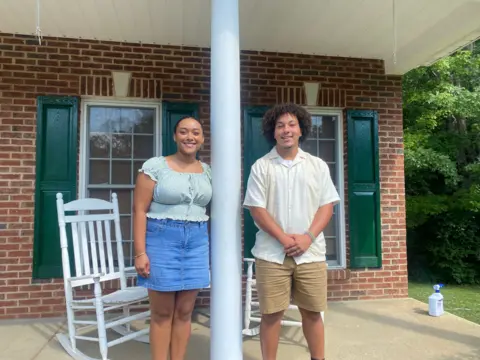Students divided after returning to schools with Confederate names restored
 Getty Images
Getty ImagesThe start of the school year often brings questions for families about schedules, supplies and new teachers. But for some students in Virginia, the most pressing question is a simple one: What should they call their school?
Briana Brown and A.D. Carter are starting their senior year of high school in Shenandoah County on Tuesday. Mr Carter, 17, plays football, he’s on the swim team and is hoping for a soccer scholarship to college next year. Miss Brown, 17, loves taking part in musicals and dressing up for homecoming week.
But their pride ends when it comes to the school’s name - Stonewall Jackson High School, named after a prominent Confederate general in America’s Civil War.
The school bore that name from 1960 until July 2021, following a 2020 school board vote to change the name to Mountain View High School, amid the racial reckoning that swept the nation after the police killing of George Floyd, an unarmed black man.
But just four years later, the school board reversed its decision, changing back to the original name honouring the Confederate general.
“I knew that I was going to feel uncomfortable having to walk back into this place after seeing it regress and go backwards in time”, said Mr Carter, who is black.
“I really don’t identify with any of the ideals nor really any of what Stonewall Jackson stood for.”
He and Miss Brown are part of a lawsuit filed by the Virginia chapter of the NAACP, claiming the change back to the historic names created an “unlawful and discriminatory” environment for black students.
The suit is the latest salvo in the national battle over what parts of American history should be honoured, and how to mark the country’s legacy of slavery.
What is in a name?
In the wake of Floyd’s death, many school districts responded by renaming schools, seeking to address historical racism by removing the names of American figures who were known to have owned slaves, fought on behalf of the Confederate army, supported segregation or otherwise furthered racism against black Americans.
Among the common school names targeted are Jackson, founding father Thomas Jefferson, who owned slaves, and Confederate General Robert E. Lee.
According to data gathered by Education Week at least 61 schools changed their names to non-Confederate names since June 2020. There are approximately 340 schools in 21 states which are currently named after Confederate figures.
Chandra Manning, a professor of history at Georgetown University, said the naming of schools after Confederate soldiers really took off in the 1950s after the government mandated that whites-only segregated schools accept black pupils, as a way to make black students feel unwelcome.
"It wasn't a widespread trend until the Brown versus Board of Education decision in 1954, which mandated the desegregation of public schools," she told the BBC. "And it was after that decision that the number and the frequency of schools named for Confederate generals quite dramatically and suddenly accelerated.
When the school board voted 5-1 to remove the name of Stonewall Jackson from the high school, in 2020, it stirred up local debate.
“There’s no way to preserve the traditions and heritage of one group and ease the inequity that another group may have felt,” Shenandoah County school board Andrew Keller said in the summer of 2020, when Stonewall Jackson High School and Ashby Lee Elementary School were considering name changes. “You can’t keep a name and remove racist implications from it. You can’t claim to be inclusive, which we do, and have students who feel like they’re excluded.”
But others were concerned that changing the name would remove an important part of local Civil War history. The lone dissenting board member asked, “where is this gonna end?” according to media reports at the time.
“Eventually we’ve got to take a stand. If not, we’re gonna lose the country,” board member Marty Helsley said.
Changing back

Now there is a counter-reckoning of sorts, as some argue names should go back to the way they were.
Shenandoah County's school district is the first in the nation to do so, restoring the names of both Stonewall Jackson High School and Ashby-Lee Elementary, named after Confederate generals, Robert E Lee and Turner Ashby. The school board declined to comment on the May vote, which was 5-1 in favour of reverting to the original name, citing the pending lawsuit.
One of the people leading the charge to restore the schools' names is Mike Scheibe, a father of two students at Ashby Lee and Civil War re-enactor, who is also the spokesperson for the Coalition for Better Schools, a local organisation that campaigned for the school board to change the names back.
He said the schools' names are a reminder of local history, and that the process to change their names didn’t account for everyone’s views, because pandemic-era restrictions made it challenging for people who opposed the change to attend school board meetings where the votes took place.
"When I look at Robert E Lee, the comparisons to him and George Washington are immense," he said, noting Washington also owned slaves.
"I wonder when George Washington's name and things like that will then have to come off of things."
"But to be taught that everyone who fought for the Confederacy, or did this, or did that, is a racist slave holder, that's all or nothing, and that really isn't doing history justice," he added.
Since winning the naming battle, the coalition also has raised money to help offset the costs of the name changes at Stonewall Jackson High School and Ashby-Lee Elementary, such as purchasing new uniforms and merchandise for the school. The old signs outside the school were kept on school grounds and were reinstalled following the vote.
Riley, 16, is about to start her junior year at the school on Tuesday. She said students are talking about the name change but doesn’t see the name as the problem, rather the back and forth.
“It’s kind of annoying for it to be changed... back and forth," she said. "I don’t really think it was a problem that needed to be changed in the first place. Just because our school is named that doesn’t mean our school and community is what people say it is.”
Her mother, Kim, said the change didn’t make a difference in a lot of the community, that it was just a lot of wasted money.
“It’s something they just did and we had to deal with it but it didn’t really matter we always still called it Stonewall," she said. “It’s just a name for us really, it doesn’t mean anything and it’s just the way it always was.”

But while those in favour of the school’s original name may have won this battle, some students are determined they will not win the war.
Miss Brown and Mr Carter, along with the Virginia NAACP, are hoping that their lawsuit will dissuade other school boards from honouring Confederate leaders and slave-holders.
The suit claims the school board is contravening the First Amendment right against compelled speech.
"The school board is compelling, forcing students to promulgate the message of support for the Confederacy, a message of being aligned with the Confederacy, and in particular, with the views of the Confederate leaders after which these schools are named," Ashley Joyner Chavous, an attorney with Covington and Burling working on the suit told the BBC.
The next hearing in the case will be 1 October.
“Whenever I see it, it makes me think of a time where I would not have been welcome at that school,” said Miss Brown, referencing the fact that the school was designated whites-only from when it opened in 1960 until 1963, when it integrated.
“It's not necessarily for me, it's for everybody, all the students of colour that are coming after me. That is who I care about,” she said. “I want them to feel comfortable in the school. And I want people to feel comfortable moving here from other places and not think that this is how we are.”
